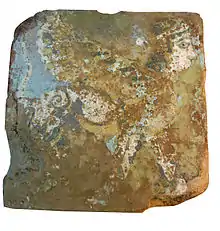Qalaichi
Qalaichi, Ghalay-chi, قلایچی in Persian (UTM 38S 615552 m E 4046795 m N) is an important archaeological site for the Iron Age of north-western Iran. It is a mountain 11m high, situated about 9 air km north-west of Bukan City in West Azerbaijan Province 18 km away from the border of Kurdistan province. The site is located near a village from whence it got its name. Hills and mountains surround it; the highest one in the east is the so-called Kal-Tage.
سه گردان، قلایچی ، قلایه چی Ghalay-chi | |
 Shown within Iran | |
| Location | Bukan, Iran |
|---|---|
| Region | West Azerbaijan province |
| Coordinates | 36°34′13″N 46°16′31″E |
| Type | settlement |
| Length | 93m |
| Width | 102m |
| Height | 1507m |
| History | |
| Material | stone, mud brick, baked brick |
| Founded | 9th-7th century BCE |
| Abandoned | ? |
| Periods | Mannean |
| Cultures | Iron Age II and III |
| Associated with | 0 |
| Site notes | |
| Excavation dates | 1985,1999-2006 |
| Archaeologists | E. Yaghmaei, B.Kargar |
| Condition | plundered, later excavated |
| Ownership | public |
| Public access | accessible |

Qalaichi is a settlement town in as we know from cuneiform texts which lay in the polity Mannea. The main period of occupation lies from the 9th to 7th centuries BCE. Key archaeological finds include a stele inscribed with an Aramaic text[1]
In addition, the ancient settlement yielded a large number of glazed objects. Some of them are monochrome and the others show complex compositions.[2] The glazed objects from the regular excavations curated in Urmia Museum and Tehran National Museum.
References
- M. A. Lemaire, L'inscription araméenne de Bukân et son intérêt historique, in Comptes rendus des séances de l'Académie des Inscriptions et Belles-Lettres, Année, vol.142,1998: 293-300; E. Yaghmaei, Discovery of a three thousand years old temple at Bukan, Keyhan Newspaper, Thursday, 11 March 1985, 9 (in Persian).
- B. Kargar, Qalaychi/Izirtu: a Mannean center, Period Ib, in M. Azarnoush (ed.), Proceedings of International Symposium on Iranian Archaeology: North-western Region, Tehran, 2004, 229–45(in Persian).
